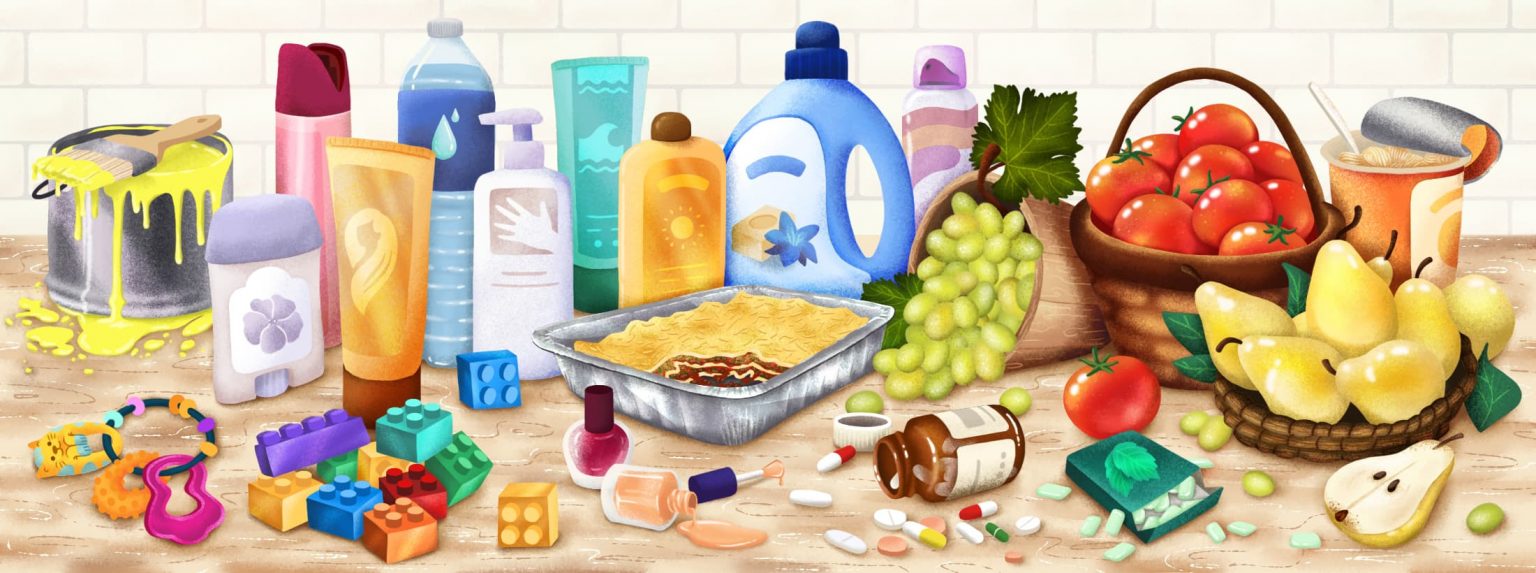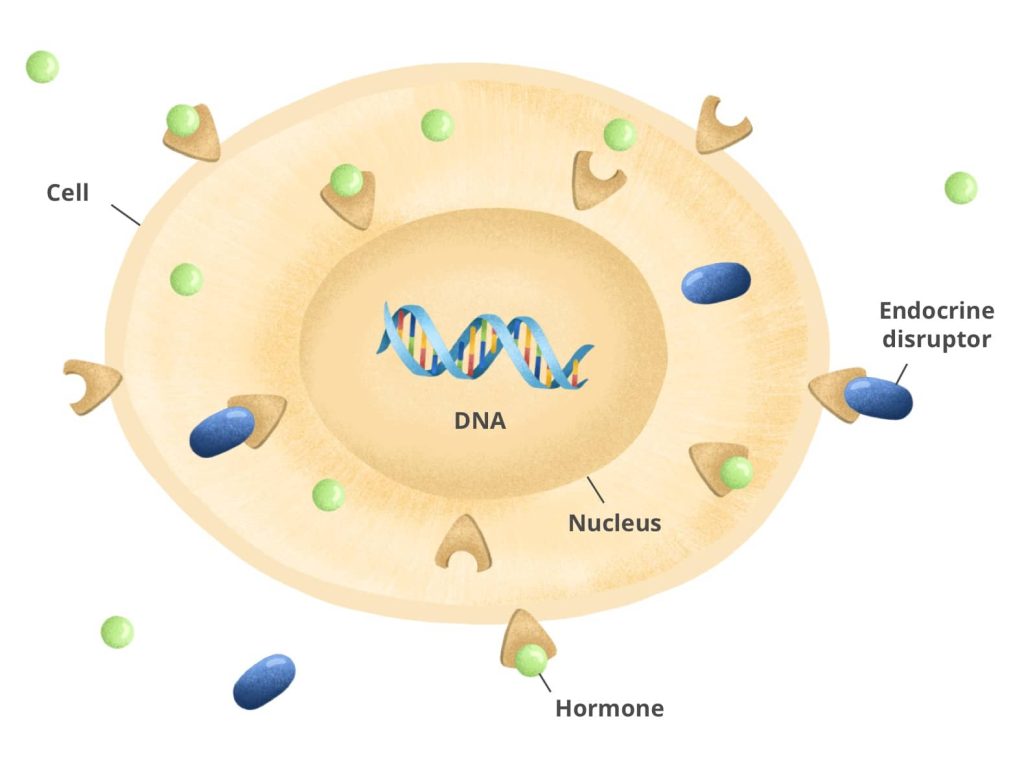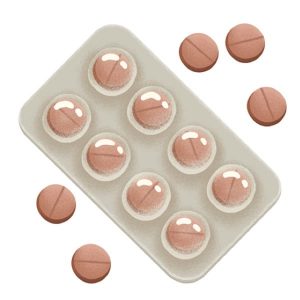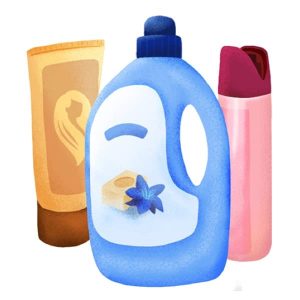
Over the course of the 20th century, the chemical industry developed more than 100,000 molecules1. Today, 40,000 to 60,000 manufactured chemical products are sold throughout the world2. Many among them are known or suspected to be endocrine disruptors.
While endocrine disruptors have been all over the media in recent years, they are also in our everyday life. They can be found in our food, our clothes, our furniture, even in the water we drink and the air that we breathe. But what are they exactly? Why are they so bad, and what solutions are there to avoid them?
Researcher and biologist Jean-Baptiste Fini, endocrine disruptor specialist, is here to help us get to the bottom of it.
What are endocrine disruptors?
According to the World Health Organization’s (WHO) definition, an endocrine disruptor is “an exogenous substance or mixture that alters function(s) of the endocrine system and consequently causes adverse health effects in an intact organism, or its progeny, or (sub) populations”³.
To understand how endocrine disruptors work, we first need to understand how hormones function. In a normal situation, our body secretes hormones which work as chemical messengers. The hormones allow our organs to communicate with each other in order to produce different reactions. Our brain acts as the conductor for the fifty or so hormones that we create.
These hormones support organ development and control long term processes of growth, reproduction, and development. They are also key players in our physiology because they regulate our appetite, temperature, sleep, and even our mood.
The problem with endocrine disruptors is that they interfere with our natural hormonal functions. They will do so in three ways :
- They can change our natural hormone production by interfering with their mechanisms for synthesis, transport, biodegradation, or elimination.
- They can mimic the actions of our natural hormones by taking their place, which causes problems when those specific hormonal functions are unnecessary.
- They can block hormone function by taking their place on receptors.

Through these different interferences, the endocrine disruptors also impact essential body functions like metabolism, reproductive health, and even nervous system functions. This leads to consequences that we will examine later in this article.
Where are they?
Endocrine disruptors tend to hide in plain sight, and we are exposed to them all the time in our daily environments.
 | Food & water |
- The presence of certain pesticides in our foods, especially in fruits and vegetables, contributes heavily to our exposure to endocrine disruptors. Out of the 90 pesticides that the European Food Safety Authority has reassessed since 2018, 10 were identified as endocrine disruptors.
- Certain food additives like BHA (E320) or BHT (E321) are among those suspected to have endocrine disrupting effects4-7.
- Tap water can also contain endocrine disruptors because of its contamination by pesticides or pharmaceutical products (specifically contraceptives).
 | Food packaging & kitchen utensils |
- Endocrine disruptors are in certain plastic wraps and containers. Phthalates, for example, can migrate into food, especially when heated8.
- Certain paper and cardboard packaging can contain perfluorinated compounds (for example, pizza boxes or microwavable popcorn packets) which work as endocrine disruptors. This packaging can produce mineral oils from its ink and adhesives which can affect endocrine disruption. These can migrate into food9,10.
- Non-stick cooking tools can also contain harmful substances, notably perfluorinated compounds (PFOA, PFOS) which act as endocrine disruptors.
 | Medicines |
- Certain drugs can have effects on endocrines11.
- By definition contraceptives, such as “the pill”, are endocrine disruptors because of how they alter hormone function by preventing ovulation.
- Drugs are designed to help take care of our bodies. The issue at hand is less about evaluating health benefits or risks, and more about their potential environmental impact (see below).
 | Cleaning & hygiene products |
- Many cleaning products contain substances that are recognized or suspected endocrine disruptors. Examples include preservatives or texturing agents (triclosan, phthalates, or certain parabens).
- Similarly, these substances appear in beauty and hygiene products (deodorants, shampoos, makeup, toothpastes, etc.).
 | Home & furniture |
- Quite a few household products and furniture contribute to indoor air pollution, mostly because they contain brominated flame retardants – substances which are designed to reduce flammability – some of which have been identified as endocrine disruptors.
- Fabric products (drapes, carpet, bedding, etc.) contain these flame retardant or stain resistant substances (perfluorinated compounds), some of which are potential endocrine disruptors.
- Furniture can emit different problematic substances, like formaldehyde. Notably furniture made from particleboard which contains an endocrine disrupting glue.
- Paint can also contain potential endocrine disruptors.
In 2019, a study by the French Public Health Agency (Santé Publique France) revealed that proven or suspected endocrine disruptors were present in the bodies of all French people, with higher rates among children. Amongst the French population, 6 families of disruptors were found: bisphenols, parabens, glycol ethers, brominated flame retardants, and perfluorinated compounds. According to the French Public Health Agency, the degree of impact measured was comparable to those of other studies conducted in the United States and Canada12.
What are the effects?
The proven or suspected effects of endocrine disruptors are numerous, impacting both human and environmental health.
Human health impact
A 2021 study conducted by the French Public Health Agency (Santé Publique France) identified more than fifty health effects which were attributed to endocrine disruptors17. According to current data, the main endocrine disrupting effects are the following:
1. Reproductive effects
Endocrine disruptors affect reproductive function on multiple levels. They can alter an individual’s reproductive development from birth: an early exposure can also lead to a predisposition for disruptions of puberty and/or of fertility18.
More particularly, endocrine disruptors can impact male and female reproduction by preventing spermatogenesis (spermatozoa formation) and oogenesis (ovum development), leading to reduced fertility19,20,23.
Exposure to endocrine disruptors could also be implicated in the appearance of testicular and ovarian malformations, the development of endometriosis, and even the occurrence of polycystic ovarian syndrome21-25.
Lastly, it is suspected that precocious puberty might be correlated with an exposure to endocrine disruptors. Girls are 10 times more likely to be affected than boys are26.
2. Obesity and diabetes
Exposure to endocrine disruptors could contribute to the increase of obesity and diabetes. Excessive eating and a lack of activity do not seem to sufficiently explain the obesity and diabetes epidemics taking place in industrialized countries.
By altering the functions of certain hormones, endocrine disruptors could interfere with the mechanisms which regulate the metabolism of carbohydrates and fat, of hunger and fullness27,28. More particularly, these endocrine disruptors can operate during fetal development, deregulating an individual’s energy levels (balance between energy input and out) and predisposing them to obesity29-32.
By interfering with insulin regulation and secretion, endocrine disruptors can lead to insulin resistance. This is a key player in the development of type 2 diabetes33.
3. Developmental disorders
Endocrine disruptors can affect various pediatric development disorders: hyperactivity, attachment disorders, emotional disorders, anxiety symptoms, aggressive behavior34-36.
Furthermore, by interfering with thyroid hormone function, which is crucial for brain development, endocrine disruptors could lower one’s IQ and cognitive abilities37-41.
4. Cancer
Certain endocrine disruptors could increase the occurrence of hormone-dependent cancers: blood, ovary, prostate, testicular, and thyroid cancers. Exposure in the womb or during childhood could be a risk factor for cancer in adulthood.42-48.
Periods of heightened vulnerability
We are more vulnerable to endocrine disruptors when our tissues and organs are developing and when our bodies are experiencing major hormone shifts.
These periods are during fetal development (mother and fetus are vulnerable), early childhood, and puberty. The first 1,000 days of life, from conception to 2 years old, is a particularly critical period which influences an individual’s future health. We must be particularly aware of our exposure to these substances during such time periods.
Environmental impact
Given their widespread presence in our daily lives, endocrine disruptors also leak into the environment and affect all living organisms. Pesticides will likewise contaminate soil and rivers, and our cleaning products end up in water treatment facilities where the disruptors will be poorly filtered (because they are not listed as products to eliminate) before the water is released into a natural environment.
Endocrine disruptors can impact all living things because all such organisms have hormones. Furthermore, hormones are exactly the same across all vertebrates. Their functions may vary, but their structures are identical. For a young developing human, thyroid hormones allow brain maturation. In adult humans, these hormones regulate our mood and body heat. These hormones play an even more spectacular role among amphibians by controlling the metamorphosis of a tadpole into a frog. This is why if an antithyroid medication ended up in a pond, it could prevent the growth of a frog.
Numerous studies demonstrate that different animal anomalies can be attributed to the harmful effects of certain endocrine disruptors. These effects have been observed among populations of fish, reptiles, invertebrates, and birds. There are too many examples of pollution’s physiological impact for us to be able to tackle them here. So, we will focus on the examples of the pesticide known as DDT and the phthalate known as DEHP.
DDT is a persistent insecticide used widely after World War II. In the areas where it has been spread, significant toxic effects were observed amidst aquatic and terrestrial populations. As such, different studies have revealed a link between DDT use and the thinning of bird shells. This has led to premature egg hatching and therefore increased mortality rates49-52. Reproductive issues were also observed in male alligators in a Florida lake during the 1980s which led to a significant decline in the population of these alligators. This decline was attributed to the large quantity of DDT spread over dozens of years which led to anomalies in the alligators’ reproductive organs53. DDT has since been banned in many countries, but its use for sanitary reasons (to fight against malaria) continues to be allowed in certain cases54.

The second example concerns the phthalate DEHP. This is a compound that the European Union classified as a substance of very high concern in 2017. DEHP (or rather its metabolite MEHP) is detectable among almost all terrestrial and marine vertebrates55,56. Even in low doses, it can have unexpected effects. Studies reveal that fetal mice, when exposed to these phthalates, can develop altered sexual behavior as adult mice and can develop brain tissue that is more vulnerable to pollutants57.
These are not the only two examples. Scientists have observed that many other environmental effects are attributable to endocrine disruptors.
Endocrine disruptors are currently poorly regulated
To date, there is not a single official list of endocrine disruptors. In April 2021, the French Agency for Food, Environmental, and Occupational Health Safety (ANSES) published a list of 900 concerned substances and a prioritization strategy in order to accelerate the identification of endocrine disruptors.
It is still not required to test products (food additives, cosmetics, drugs, toys, packagins, etc.) for their endocrine effects before putting them on the market: neither the product nor its components are subject to such evaluation.
Since 2018, within the European Union, only pesticides and biocides have been required to undergo endocrine evaluation before being sold publicly. Currently, commercially available pesticides and biocides must be subject of a retroactive assessment – which could lead to restrictions or a complete ban – but this process unfortunately takes time. For other product groups, a guide is expected in 2022.
According to the European Union regulatory initiative REACH (Registration, Evaluation, Authorization, and Restriction of Chemicals), which began in 2007, substances with endocrine disrupting properties can be identified as “substances of very high concern” but this will not directly lead to a ban on their usage. These files are submitted by Member States: every Member State then votes on the future of the product in question. In 2021 for example, despite evidence about the thyroid impact of resorcinol (an ingredient found mainly in cosmetics), the Member States did not vote to ban it.
The current underregulation of endocrine disruptors demonstrates that it is essential that it evolves in order to protect future consumers.
Effects even at low doses
Certain endocrine disruptors contradict a longstanding adage in toxicology – that “the dose makes the poison.” Multiple studies have demonstrated that these substances can produce negative side effects even in very small doses.
These studies even reveal that low quantities of such substances can produce more effects than high quantities can. For certain substances, we can go so far as to observe an effect at a low dosage and no effects at a high dosage58,59.
For example, Sarah Jenkins’s work on Bisphenol A uses a transgenic mouse model and demonstrates that BPA impacts tumor size. Her study observed that BPA affects tumor development among rodents at very low doses (below the recommended daily intake). Then, it is at intermediate doses that they observed the strongest effects on tumor size, with impact diminishing at very high doses60.
In a similar way, one phthalate study found that these substances can have an effect on mouse behavior when present at low doses but not at high doses61.
The same effect was observed for perfluorinated compounds – like PFOS – currently used in numerous products like waterproof fabrics, nonstick coatings, or certain food packaging. One study conducted on tadpoles revealed that PFOS disrupts healthy thyroid function at intermediate doses but not at high or low doses38.
A concerning combination effect
Another significant issue presented by endocrine disruptors: they can potentially become more toxic when mixed together. In other words, several substances below the regulatory thresholds (considered to be protective) could lead to an endocrine disruptive effect. This is what we call this a “combination effect”62-64. This effect calls into question the current risk assessment procedure which is based on individual molecule evaluation. This does not seem to fully consider the fact that we are usually exposed to a mixture of chemicals.
An international study published in 2022 demonstrates that exposure to a mixture of chemicals (phthalates, phenols, and perfluorinated compounds) has endocrine disruptive effects and that overexposure during pregnancy impacts child brain function, leading to language delay65.
This combination effect considerably complicates the study of endocrine disruptors: to study this effect, it is necessary to test every possible combination with thousands of possible mixes of chemicals suspected of having endocrine effects.
How can we avoid them?
These days, it is difficult to avoid endocrine disruptors because they have become so common in our environment. However, it is possible to reduce our exposure as much as possible while we wait for the implementation of regulations that appropriately ban these substances.
 | Food & water |
- Avoid consuming too many foods that have been in contact with plastic packaging
- Use inert materials (glass, stainless steel, ceramic) for preparation and storage of food
- Do not reheat food in plastic containers
- Opt to buy organically grown products
- Reduce consumption of processed foods that can contain problematic additives
- Avoid non-stick utensils (pans especially) and throw away non-stick pots as soon as the coating is damaged
- Use iodized salt to avoid iron deficiencies. Iodine is essential for the synthesis of thyroid hormones.
 | Cleaning & hygiene |
- Reduce usage of unnecessary cleaning products and opt for natural products like white vinegar, baking soda, and Marseille soap
- Avoid cosmetic products with preservatives like paraben
- Opt for organic cosmetics which restrict the use of many problematic substances
- Use organic or washable diapers for babies (cotton diapers can contain residues of problematic pesticides)
- In the same way, opt for hygienic products (pads, tampons) made from organic cotton
 | Home & furniture |
- Aerate the inside of your home for 15 minutes everyday and regularly vacuum: indoor pollution is a significant source of endocrine disruptor exposure
- Avoid using aerosols (deodorants, waterproofers, disinfectants), candles or incense that can contribute to air pollution
- Avoid carpet and vinyl flooring
- Clean new fabrics (bedding, cushions, rugs, drapes…) before using or opt for second hand textiles
- Opt for furniture made from untreated natural materials and avoid furniture made of PVC or plywood which contains glues and plastics which can release harmful chemicals into your home
- Opt for second hand furniture
- Prepare a newborn’s bedroom as much as possible multiple weeks before the birth, by aerating it every day
- Shut off your computer and mobile phone at night (or at least put it to sleep / on airplane mode), because their hard drives contain flame retardants which release harmful products during operation
 | Clothing |
- Wash new clothes before wearing them
- Do not wear clothing made with synthetic materials outside of athletic activities
 | Kids’ toys |
- Clean new toys in soap and water before giving them to a child
- Opt for kid toys that are made of wood and organic fabric
- Limit the number of toys made of plastic or treated wood, especially if kids put them in their mouths
- Opt for second hand toys (that have been recently produced)
- ¹ https://www.zerodeconduite.net/article/au-cours-du-xxe-siecle-plus-de-100-000-molecules-ont-ete-concues-par-lindustrie-chimique
- ² International Council of Chemical Associations (Icca) and the United Nations Environment Programme (Unep), 2019. Submission of the International Council of Chemical Associations (ICCA) and the United Nations Environment Programme (UNEP): Knowledge Management and Information Sharing for the Sound Management of Industrial Chemicals. Retrieved from. http://www.saicm.org/Portals/12/Documents/meetings/OEWG3/inf/OEWG3-INF-28-KMI.pdf.
- ³ WHO - https://www.who.int/publications/i/item/state-of-the-science-of-endocrine-disrupting-chemicals
- ⁴Jeong SH, Kim BY, Kang HG, Ku HO, Cho JH. 2005. Effects of butylated hydroxyanisole on the development and functions of reproductive system in rats. Toxicology 208(1):49-62.
- ⁵ Kang HG, Jeong SH, Cho JH, Kim DG, Park JM, Cho MH. 2005. Evaluation of estrogenic and androgenic activity of butylated hydroxyanisole in immature female and castrated rats. Toxicology 213(1-2):147-156.
- ⁶ Soto AM, Sonnenschein C, Chung KL, Fernandez MF, Olea N, Serrano FO. 1995. The E-SCREEN assay as a tool to identify estrogens: An update on estrogenic environmental pollutants. Environ Health Perspect 103 (Suppl 7):113-122.
- ⁷ Hughes PJ, McLellan H, Lowes DA, Khan SZ, Bilmen JG, Tovey SC, Godfrey RE, Michell RH, Kirk CJ, Michelangeli F. 2000. Estrogenic alkylphenols induce cell death by inhibiting testis endoplasmic reticulum Ca2+ pumps. Biochem Biophys Res Commun 277(3):568-574.
- ⁸ Geueke B, Muncke J. Substances of very high concern in food contact materials: migration and regulatory background. Packag Technol Sci. 2018;31(12):757–69
- ⁹ ANSES issues recommendations to reduce foodstuff contamination by mineral oils
- https://www.anses.fr/en/content/anses-issues-recommendations-reduce-foodstuff-contamination-mineral-oils
- ¹⁰ Opinion of Anses on the migration of mineral oil compounds into food from recycled paper and cardboard packaging.
- https://www.anses.fr/en/content/opinion-anses-migration-mineral-oil-compounds-food-recycled-paper-and-cardboard-packaging
- ¹¹ Albert O, Desdoits-Lethimonier C, Lesné L, Legrand A, Guillé F, Bensalah K, Dejucq-Rainsford N, Jégou B. Paracetamol, aspirin and indomethacin display endocrine disrupting properties in the adult human testis in vitro. Hum Reprod. 2013 Jul;28(7):1890-8.
- ¹² https://www.santepubliquefrance.fr/etudes-et-enquetes/esteban/les-resultats-de-l-etude-esteban
- ¹³ https://echa.europa.eu/fr/candidate-list-table
- ¹⁴ Rochester J, Bolden A. Bisphenol S and F: a system-atic review and
- comparison of the hormonal activity of bisphenol A substitutes. Environ Health Perspect 2015; 123: 643-8.
- ¹⁵ Catenza CJ, Farooq A, Shubear NS, Donkor KK. A targeted review on fate, occurrence, risk and health implications of bisphenol analogues. Chemosphere. 2021 Apr;268:129273.
- ¹⁶ https://www.anses.fr/fr/system/files/REACH2019SA0221.pdf
- ¹⁷ https://www.santepubliquefrance.fr/content/download/379523/3178919
- ¹⁸ https://presse.inserm.fr/en/the-impacts-on-reproductive-function-of-early-exposure-to-endocrine-disruptors/44206/
- ¹⁹ Sengupta P, Borges E Jr, Dutta S, Krajewska-Kulak E. Decline in sperm count in European men during the past 50 years. Hum Exp Toxicol. 2018 Mar;37(3):247-255.
- ²⁰ M Istvan, R Rahban, B Dananche, A Senn, E Stettler, L Multigner, S Nef, R Garlantézec, Maternal occupational exposure to endocrine-disrupting chemicals during pregnancy and semen parameters in adulthood: results of a nationwide cross-sectional study among Swiss conscripts, Human Reproduction, Volume 36, Issue 7, July 2021, Pages 1948–1958.
- ²¹ Caserta D, Maranghi L, Mantovani A, Marci R, Maranghi F, Moscarini M. Impact of endocrine disruptor chemicals in gynaecology. Hum Reprod Update. 2008 Jan-Feb;14(1):59-72.
- ²² Willson CJ. Phthalate Toxicity in Rats and Its Relation to Testicular Dysgenesis Syndrome in Humans. Toxicol Pathol. 2021 Dec;49(8):1416-1424.
- ²³ Vabre P, Gatimel N, Moreau J, Gayrard V, Picard-Hagen N, Parinaud J, Leandri RD. Environmental pollutants, a possible etiology for premature ovarian insufficiency: a narrative review of animal and human data. Environ Health. 2017 Apr 7;16(1):37. doi: 10.1186/s12940-017-0242-4. PMID: 28388912; PMCID: PMC5384040.
- ²⁴ De Coster S, van Larebeke N. Endocrine-disrupting chemicals: associated disorders and mechanisms of action. J Environ Public Health. 2012;2012:713696. doi: 10.1155/2012/713696. Epub 2012 Sep 6. PMID: 22991565; PMCID: PMC3443608.
- ²⁵ Tsutsumi O. Assessment of human contamination of estrogenic endocrine-disrupting chemicals and their risk for human reproduction. J Steroid Biochem Mol Biol. 2005 Feb;93(2-5):325-30.
- ²⁶ Rigou A, Le Moal J, Le Tertre A, De Crouy-Chanel P, Léger J, Carel JC. L’incidence de la puberté précoce centrale idiopathique en France révèle une hétérogénéité géographique importante. Bull Epidémiol Hebd. 2018;(22-23):464-71.
- ²⁷ Casals-Casas, C. and B. Desvergne, Endocrine disruptors: from endocrine to metabolic disruption.
- Annu Rev Physiol, 2011. 73: p. 135-62.
- ²⁸ Diamanti-Kandarakis, E., et al., Endocrine-disrupting chemicals: an Endocrine Society scientific statement.
- Endocr Rev, 2009. 30(4): p. 293-342.
- ²⁹ Braun JM. Early-life exposure to EDCs: role in childhood obesity and neurodevelopment. Nat Rev Endocrinol. 2017 Mar;13(3):161-173.
- ³⁰ Leppert B, Strunz S, Seiwert B, Schlittenbauer L, Schlichting R, Pfeiffer C, Röder S, Bauer M, Borte M, Stangl GI, Schöneberg T, Schulz A, Karkossa I, Rolle-Kampczyk UE, Thürmann L, von Bergen M, Escher BI, Junge KM, Reemtsma T, Lehmann I, Polte T. Maternal paraben exposure triggers childhood overweight development. Nat Commun. 2020 Feb 11;11(1):561.
- ³¹ La Merrill M, Birnbaum LS. Childhood obesity and environmental chemicals. Mt Sinai J Med 2011;78(1):22-48.
- ³² Birnbaum LS. When environmental chemicals act like uncontrolled medicine. Trends Endocrinol Metab 2013 ; 24(7):321-3
- ³³ P. Alonso-Magdalena, S. Morimoto, C. Ripoll, et al. The estrogenic effect of bisphenol A disrupts pancreatic ß-cell function in vivo and induces insulin resistance Environ Health Perspect, 114 (2006), pp. 106–112
- ³⁴ Philippat C et al., « Prenatal exposure to nonpersistent endocrine disruptors and behavior in boys at 3 and 5 years », Environmental Health Perspectives, vol. 125, n° 9, septembre 2017
- ³⁵ Perera F et al., « Bisphenol A exposure and symptoms of anxiety and depression among inner city children at 10-12 years of age », Environmental Research, août 2016
- ³⁶ Braun JM et al., « Impact of early-life bisphenol A exposure on behavior and executive function in children », Pediatrics 128 (5):873–882, 2011
- ³⁷ Michael A.Woodleyab, Jante Nijenhuisc, Raegan Murphy, "Were the Victorians cleverer than us? The decline in general intelligence estimated from a meta-analysis of the slowing of simple reaction time" Intelligence, 41(6), November–December 2013, pp. 843-850
- ³⁸ Fini, JB., Mughal, B., Le Mével, S. et al. Human amniotic fluid contaminants alter thyroid hormone signalling and early brain development in Xenopus embryos. Sci Rep 7, 43786 (2017).
- ³⁹ Factor-Litvak P et al., « Persistent Associations between Maternal Prenatal Exposure to Phthalates on Child IQ at Age 7 Years ». PLoS One, 2014
- ⁴⁰ Caporale N et al. From cohorts to molecules: Adverse impacts of endocrine disrupting mixtures. Science. 2022 Feb 18;375(6582):eabe8244.
- ⁴¹ https://chemtrust.org/wp-content/uploads/chemtrust-nobrainer-mar17.pdf
- ⁴² Cohn BA, Wolff MS, Cirillo PM, Sholtz RI. DDT and breast cancer in young women: new data on the significance of age at exposure. Environ Health Perspect. 2007;115(10):1406-1414. doi:10.1289/ehp.10260
- ⁴³ Barbara A. Cohn, Michele La Merrill, Nickilou Y. Krigbaum, Gregory Yeh, June-Soo Park, Lauren Zimmermann, Piera M. Cirillo, DDT Exposure in Utero and Breast Cancer, The Journal of Clinical Endocrinology & Metabolism, Volume 100, Issue 8, 1 August 2015, Pages 2865–2872
- ⁴⁴ https://www.santepubliquefrance.fr/determinants-de-sante/exposition-a-des-substances-chimiques/perturbateurs-endocriniens/documents/rapport-synthese/etude-peps-pe-priorisation-des-effets-sanitaires-a-surveiller-dans-le-cadre-du-programme-de-surveillance-lie-aux-perturbateurs-endocriniens-de-sa
- ⁴⁵ Kahn LG, Philippat C, Nakayama SF, Slama R, Trasande L. Endocrine-disrupting chemicals: implications for human health. Lancet Diabetes Endocrinol. 2020 Aug;8(8):703-718.
- ⁴⁶ Del Pup L, Mantovani A, Luce A, Cavaliere C, Facchini G, Di Francia R, Caraglia M, Berretta M. Endocrine disruptors and female cancer: Informing the patients (Review). Oncol Rep. 2015 Jul;34(1):3-11.
- ⁴⁷ Corti M, Lorenzetti S, Ubaldi A, Zilli R, Marcoccia D. Endocrine Disruptors and Prostate Cancer. Int J Mol Sci. 2022 Jan 21;23(3):1216.
- ⁴⁸ Hoffman K, Lorenzo A, Butt CM, Hammel SC, Henderson BB, Roman SA, Scheri RP, Stapleton HM, Sosa JA. Exposure to flame retardant chemicals and occurrence and severity of papillary thyroid cancer: A case-control study. Environ Int. 2017 Oct;107:235-242.
- ⁴⁹ Printemps silencieux, Rachel Carson, 1962
- ⁵⁰ Hickey JJ, Anderson DW. Chlorinated hydrocarbons and eggshell changes in raptorial and fish-eating birds. Science. 1968 Oct 11;162(3850):271-3.
- ⁵¹ Peterson SH, Ackerman JT, Herzog MP, Toney MS, Cooney B, Hartman CA. Avian eggshell thickness in relation to egg morphometrics, embryonic development, and mercury contamination. Ecol Evol. 2020;10(16):8715-8740. Published 2020 Jul 20.
- ⁵² David B. Peakall, David S. Miller, William B. Kinter, Blood calcium levels and the mechanism of DDE-induced eggshell thinning. Environmental Pollution (1970), Volume 9, Issue 4, 1975, Pages 289-294, ISSN 0013-9327.
- ⁵³ Semenza JC, Tolbert PE, Rubin CH, Guillette LJ Jr, Jackson RJ. Reproductive toxins and alligator abnormalities at Lake Apopka, Florida. Environ Health Perspect. 1997 Oct;105(10):1030-2.
- ⁵⁴ WHO gives indoor use of DDT a clean bill of health for controlling malaria. Indian J Med Sci. 2006 Oct;60(10):439-41. PMID: 17405231.
- ⁵⁵ Caporale et al. From cohorts to molecules: Adverse impacts of endocrine disrupting mixtures. Science. 2022 Feb 18;375(6582):eabe8244.
- ⁵⁶ Heli Routti, Mikael Harju, Katharina Lühmann, Jon Aars, Amalie Ask, Anders Goksøyr, Kit M. Kovacs, Christian Lydersen, Concentrations and endocrine disruptive potential of phthalates in marine mammals from the Norwegian Arctic, Environment International, Volume 152, 2021, 106458, ISSN 0160-4120,
- ⁵⁷ Neural mechanisms underlying the disruption of male courtship behavior by adult exposure to Di(2-ethylhexyl) phthalate in mice, Carlos Dombret, Daphné Capela, Kevin Poissenot, Caroline Parmentier, Emma Bergsten, Cédric Pionneau, Solenne Chardonnet, Hélène Hardin-Pouzet, Valérie Grange-Messent, Matthieu Keller, Isabelle Franceschini, Sakina Mhaouty-Kodja. Environmental Health Perspectives, 1er septembre 2017.
- ⁵⁸ Fagin, D. (2012). Toxicology: The learning curve. Nature 490, 462–465 (25 October 2012)
- ⁵⁹ Montévil M, Acevedo N, Schaeberle CM, Bharadwaj M, Fenton SE, Soto AM. A Combined Morphometric and Statistical Approach to Assess Nonmonotonicity in the Developing Mammary Gland of Rats in the CLARITY-BPA Study. Environ Health Perspect. 2020 May;128(5):57001.
- ⁶⁰ Jenkins S, Wang J, Eltoum I, Desmond R, Lamartiniere CA. Chronic oral exposure to bisphenol A results in a nonmonotonic dose response in mammary carcinogenesis and metastasis in MMTV-erbB2 mice. Environ Health Perspect. 2011 Nov;119(11):1604-9.
- ⁶¹ Neural mechanisms underlying the disruption of male courtship behavior by adult exposure to Di(2-ethylhexyl) phthalate in mice, Carlos Dombret, Daphné Capela, Kevin Poissenot, Caroline Parmentier, Emma Bergsten, Cédric Pionneau, Solenne Chardonnet, Hélène Hardin-Pouzet, Valérie Grange-Messent, Matthieu Keller, Isabelle Franceschini, Sakina Mhaouty-Kodja. Environmental Health Perspectives, 1er septembre 2017.
- ⁶² Delfosse V, Huet T, Harrus D, Granell M, Bourguet M, Gardia-Parège C, Chiavarina B, Grimaldi M, Le Mével S, Blanc P, Huang D, Gruszczyk J, Demeneix B, Cianférani S, Fini JB, Balaguer P, Bourguet W. Mechanistic insights into the synergistic activation of the RXR-PXR heterodimer by endocrine disruptor mixtures. Proc Natl Acad Sci U S A. 2021 Jan 5;118(1):e2020551118.
- ⁶³ Silva E, Rajapakse N, Kortenkamp A. Something from "nothing"--eight weak estrogenic chemicals combined at concentrations below NOECs produce significant mixture effects. Environ Sci Technol. 2002 Apr 15;36(8):1751-6.
- ⁶⁴ Delfosse V, Dendele B, Huet T, Grimaldi M, Boulahtouf A, Gerbal-Chaloin S, Beucher B, Roecklin D, Muller C, Rahmani R, Cavaillès V, Daujat-Chavanieu M, Vivat V, Pascussi JM, Balaguer P, Bourguet W. Synergistic activation of human pregnane X receptor by binary cocktails of pharmaceutical and environmental compounds. Nat Commun. 2015 Sep 3;6:8089.
- ⁶⁵ Caporale N et al. From cohorts to molecules: Adverse impacts of endocrine disrupting mixtures. Science. 2022 Feb 18;375(6582):eabe8244.








Is there a version of Yuka that can be used to analyze food products?
I love yuka app .This app is helping me to choose the better food for me. Thanks very much good job.
I think it’s very important to add perfumes/colognes to this list. I was using perfume my whole life until I learned they contained endocrine disruptors. Now I only use natural things…
Plus this summer I learned that a lot of receipts have BPA in the paper!
Thank you SO MUCH for being a pioneer in a much needed area? I’ve passed on the APP to several people and use it constantly whilst shopping!
Great read, I will continue to do my best to reduce my exposure to these chemicals.
Thank you!!!
Extremely interesting and disturbing
Thank you for the education
Thank you so much. Excellent 👏👏👍
Muchas gracias por la informacion. Muy importante!
Thank you so much for warning humanity throughout This such an important information !! May our CREATOR continue blessing you 🙏
Thanks for your diligence. I wonder what would be the alternative to vinyl or carpet flooring, natural wood or cork flooring?
Thank you for your valuable information! Very enlightening.
Excellent!
Hi Julie, thank you for your excellent info.
Would you advise me about what is the non-poison dishwasher soap?
Best regard
Thanks a lot for this wonderful information. I never new this. But can you explain more about how to avoid this?
Very informative ,but i wish there were a list of products given..
1st. I’ve heard of any of this! Wonderful to know. Time to clean house!!
Great article! Very informative 🙂
Thanks so much for this valuable information! The more we’re educated and aware the better we and our families can become healthier and demand changes!
What a great article thanks for all the info.
Wow, it’s crazy to know how many harmful products etc are on the market that we are not aware of. Totally irresponsible manufacturing companies knowingly keep using these harmful chemicals. I have been using the Yuka app for about 6 months and so appreciate it Thank you
Thank You Julie!
Thank you so much for sharing this knowledge, I’m a 70 year old lady. I use this app every time I go to the store, I been sharing the app with family and friends! This app empower us to make better choices with the food we eat and what we use every day in our homes! Thank you!
Hello
I was introduced to the app Yuka several months ago by a total stranger that had noticed that I was taking time to read the labels on several cereal boxes and he proceeded to tell me about how I could this app to determine what product I should buy. I was impressed and began sharing this info with others. I have been reading food labels since 1988 or 1989 when my doctor made me aware of the importance of avoiding saturated fats e.g. butter vegetable oils bacon beef and other high fat foods because of my family history of cardiovascular disease/ DM. Thank you for caring enough to create something that the general public can use to improve their healthy options Marie M.
Where can I get the recipe for Marseille soap to make at home? If you can’t get that for me, what Marseille soap is the best one to buy? Thank you.
Thank you.. very informative!! Finally someone took the time to explain what an endocrine disrupters are and how they work..
Thank you
Thank You for the excellent information’s
Thank you for this information!!! It is a scary time in which we live!!
Thank you for all of the information. Knowledge is power.
This was a very interesting article to read. It is very scary to read what we need to do. Why didn’t we know about these things earlier?
I feel for the younger generation to combat these problems.
Good work!
Thank you
Very interesting
Love the app. Could you give us some pointers on healthy cooking oils and maybe include those in your ratings
Thank you
Thanks for this info – I was not aware of so many areas of the disrupters.
Great article so informative and appreciated the suggestions.
Very informative information, shopping at the beauty supply stores,/supermarkets my phone is always in hand scanning products before I purchase. Thanks a lot for the article, and Yuka app!!!
Will Yuka begin to rate products based on their packaging as well? Seems like that would be a good addition to helping us all make better choices.
Thank you soooooo much! Let’s make the world a cleaner place — one article at a time. I tell everyone about Yuka!!! The more informed we are, the better the choices we will make!!! 💕👍😁
Thank you. I am sick a long time and now the doctor found heavy metals in my brain. I have been insomnia, depression and hormones imbalance.
Thank you for all of these reminders. Alot of them are avoidable.
Synthetic material in clothing is just about all there is these days. I read labels that say made from recycled something. I always think to myself how icky that sounds, yet it’s seems to be a selling point as they label as such. Thank you for the article.
Helplful, but depressing. It seems impossible to completely avoid these disruptors. Also, very expensive, as organic foods, clothing, cosmetics, etc. are much more expensive than non-organic. Trying to avoid any foods wrapped in plastic? impossible in the U.S. But thanks for the article.
Not sure where you live, or how accessible a farmers market is, but a framers market is a GREAT solution to our fruits and veggies being wrapped in plastic or be treated with plastic for storage preservation…THEY’RE NOT :-))))) It’s just amazing tasting food picked at it’s peak ripeness.
All the best…
This is so depressing but thank you for great information and everything you do at Yuka!
Great article and amazing how many toxins we come in contact with. My Yuka app has been a major aid in my grocery shopping and I share it religiously with others.
Is there any vitamins/herbal supplements that can counter act these dangerous chemicals? Obviously trying to avoid and take precautions to help prevent digestion/breathing these chemicals. Appreciate the article.
Thank you! Really helpful. Quite difficult go share these warnings with kids.. but I’m glad yuka is nos my daughter’s reference 🙏🏻
Thank you for this great article. The reasons and understanding of things hiding in the cracks. Scary world
This is amazingly accurate and very scary
Great article, thanks for posting!
Why is Yuka charging now?
What do you mean?
Wow, good to know! I feel like we are never told about these things, and you wonder why so many people have cancer, health issues, and so much more. Eating healthy and exercising plays a big role in health and I feel like so many people focus on that and only that, whereas if everyone knew about this, this also plays an even bigger role in health, and long term health. I wish there were better options. But it’s nice to be informed properly. I’ve absolutely loved being a member of Yuka! I love that I can easily scan my food or makeup products and see exactly what’s in them, and I get emails like this to be even more up to date. Thank you Julia!
Thanks for the enlightenment!
Thank you for this update. It seems like an overwhelming task to get back to the basics of all natural remedies.
Great article and great App… thank you!
Thanks for this article!
Shouldn’t you especially not wear synthetic fibers when you are exercising since you’re sweating and your pores are open making it more likely to absorb them?
THANKYOU for this informative article. Love your app while shopping.
Thank you for this article on Endocrine disrupters! Also, I have found your Yuka phone app for fod buying extremely helpful in my efforts to eat better fand safer food.
Appreciate the awareness this brings. Hoping that there will be real change in our country’s policies to prevent the use of endocrine disruptors and thankful for the ideas of how to avoid them as much as possible. Thank you again for sharing this.
Thank you for all your help. You are doing a good job.
Bearing in mind the knowledge so clearly summarized in this article, it will be obvious that endocrine disruptors may influence gender-specific development in our youth today. What I am saying is that if there has been a rise in the number of ‘effeminate’ boys and ‘boyish’ girls in recent decades, this could have been a result of endocrine disruptor effects both before and after birth. It pains me to think about the social stressors imposed on ‘trans’ persons these days. More compassion is called for. What if sex-change candidates are not responsible for their predicaments, but that chemicals we (including pregnant mothers) are exposed to have been ‘pushing’ sexuality one way or the other?
I completely agree with you on this. I’ve always believed that endocrine disruptions have caused gender identity disorders or sex hormone disorders as well as autism and autoimmune disease’s. Anyone you thinks with a brain can see the massive increases in these disorders in the last 50 years. I believe our over exposure to these toxic chemical substances in basically all the products we use contributed to this. Sunscreen is a huge contributor to sex hormone disruption in young boys. They did a study and found that fish either stopped reproducing or they developed both sex organs Because of sunscreen chemicals in the water. Basically we/our children are being poisoned to death and it doesn’t seem to bother any of these companies that make and produce these products. When they damn well know what harmful chemicals they are using in their products. It’s truly sad.
Great to know & learn
Thank you for feeding us this insightful information. Keep up the good work!
Very informative! Thank you.
There definitely should be more accountability with all manufacturers. Also, the word organic is so overused. I do look for USDA and even review EWG. One has to know how to navigate it all and to increase consumer awareness. We all deserve it be simpler and healthier in the USA!
Thank you. This is very useful information.
The article was interesting, however, did not address the question regarding “natural flavors “ which is found in much of our food choices today. Natural flavors is a cover for monosodium glutamate which is a flavor enhancement used mostly in Chinese dishes and was banned because it causes cancer. Natural flavors can also contain a combination of at least 20 other toxic chemicals as well. And when listed in the ingredients on packaging the higher up on the list indicates the amount used to get the desired taste. The product I questioned it was listed 4th. Usually the first 5 ingredients contain the highest percentage. So for me even though you have listed the product as good to excellent if it has natural flavors or other ingredients I’ve learned not to be good for me I will leave them on the shelf. For the most part your app is very good. I have been a label reader/checker of ingredients for many years now. If I didn’t understand a word I’d go look it up check for side effects, etc before I purchased it. Most people just look at the front of the label. Thanks again for the article.
Wow!
What can we do to help?
Appears quite daunting to follow all these greatly appreciated well researched guidelines. Isn’t the real problem the manufacturers of all these products?? How do we make changes at the source??
Great article ! There is so
much to learn about how to make our environment safer …food safer … better health.. anything we can learn will help us all.
Wish we could scan pet food and livestock food!!
Thank you for this very important and information article.
Thank goodness we have our friends in Europe sharing this information. Keep up the good work!
Great article. I’m a chef in Florida and have been openly speaking towards the health impacts of processed foods and recently discovered the YUKA app. I have been teaching cooking classes and spoke with Harvard students about the affects of additives. Sharing this info with everyone I talk to. I have a dream of having ALL restaurants become YUKA approved. MOST restaurants are serving processed garbage and I want to expose them all!!! This is how we can create real change.
Maybe that will be your next app?? Scanning items for endocrine disruptors.
Great information! As a 47 year old,3 yr breastfeeding cancer warrior now. I am appalled after all these years, I am just now finding out that mostly everything we consume is contaminated and is not good for us. I thought the FDA was regulating healthy substances that are in our food but they are doing the opposite just for the money. When is the government going to learn to care for its people and realize we are human beings, and our bodies should be treated as temples, it should be treated as such, our body knows when something is not right for us. I am just disgusted with the United States now! I should moved back to my home island country a long time ago.
Correct. All by design decades ago to destroy the human population and create transhumanism
Where is your home town?
Perhaps it’s better there?
I often think is there a safer place to live ??
Your app was given to me by a nurse after being diagnosed with CLL unexpectedly as I had no symptoms. This app has helped me change just about everything I do to try and stay healthy the best I can. I have even found bath towels at Penney’s that are tagged being made of healthy materials. You have opened my eyes to do many things. Just wish I had been made aware sooner. I’m praying this younger generation will pay attention to their world. Thank you.
Humanity really blows me away. There’s so many variations of attitudes. There of I’ve taken the time to kind of go through some of the comments that were left here and it’s amazing to me the negativity the pessimistic attitudes. It just blows me away. I’m not a pessimist I’m an optimist and yeah, there might be some Buzz words that say basically not sure could could be what what have you but it’s always good to be aware to be safe and thank God for the folks in the world they care enough to do some rigorous testing to ensure that the quality of our lives with what we eat and drink, etc. etc. is not harming us. I don’t think there’s anything wrong with that I think that’s a very good thing. I wish the negativity of the folks out there with cease because it’s not helping anyone if you’re negative like that, keep your comments to yourself because your comments are toxic they’re toxic and then not helping anyone. It seems there’s more folks leaving positive comments as opposed to those that are leaving negative comments . Yuka keep up the good work. You guys are doing great
Great information! I’ll be passing this article to family and friends. Thank you for caring for our health. We need to keep learning and making the changes we need.
It almost seems impossible to keep harmful products a safe distance away. This information about endocrine disruptors is very eye-opening. Your efforts are greatly appreciated. Thank you!
Thank you, very informative. I have changed so many things through the years. I remember there were books in the 70’s exposing the hazards in our world, but the writers disappeared. I tell every one I meet about Yuka, even in the grocery store!
It would be upsetting for some people to consider that sexual identity can be altered by these chemicals not just fertility. There seems to be an epidemic of young people opting to TRANSition from their birth sex. The numbers of young men ‘becoming women’ seems epidemic, though I don’t know their numbers.
(I love YUKA by the way)
Great informative article. Yuka is a wonderful app I tell everyone about and use every week.
Excellent Article Julie!
Thank-you for being our eyes and ears on what’s happening out there.
I’m spreading your app to everyone I meet, the more awareness we have the better choices are made.
Hopefully your app will help the food industry to come up with a better transparent organic product!
Keep up the good work!
Bob
The enemy came to kill, steal and destroy which is why Yahushua tells us throughout the Gospels to qodesh (seperate) from the world. So, as long as we know this, learn and do better, that’s all we can do and with doing so will live a more joyful life. Thank you Yuka for making this a little bit easier!
Esto es muy enriquecedor e interesante, una pregunta cuando escaneo un producto y dice 90/% quiere decir
The problem is that in my opinion most people doesn’t care what they are eating and they will not spend the time scanning all products that they purchase it’s unbelievable I scan everything it’s kinda scary what the FDA is allowing in 98% of all foods we consume !!!!!!’
I use the Yuka App at every shopping trip. It takes me longer to shop now, but it’s well worth it. It is the best App on my phone, and I have told many people I meet in the store about it.
Thank you for the interesting article. I use the Yuka app when shopping all the time.
We are 83 and have been purchasing organic food for over 20 years. We drink PH 9.5 water from a machine, no plastics. I cook 95% from scratch. I love your website and messages. I found some healthier items through the app. We only take supplements no drugs at all. We walk 2-3 miles a day and mostly in nature. We don’t have any stress and live an effortless life. Thanks for your work and the information you sent us.
Source of your H2O machine?? I would love that! Putting the body in an alkaline state is very beneficial in many ways 🙂
I have been diagnosed with allergies to certain preservatives that are allowed in North America….but have been banned in the UK. These preservatives are in most cosmetics , health care and cleaning products…. Why are they still being used here?????
Because the all mighty $$$$ is more important than you, or I, or anyone else in the good ol’ US of A. 😐
We are F**ked.
So basically everything, everywhere. Don’t drink or eat anything. Live in a faraway cage and die ASAP because we are screwed.
Exactly🙈
Thank you for this article. Although I have been using the Yuka app, the article expands greatly on the knowledge that I had. There are so many more things things that I can do to live a healthy lifestyle.
Thank you for your help
I appreciate your commitment to healthier options and your extensive knowledge. Excellent article. Thank you so much for researching these things and then passing it on to us. . Thank you so much. You have educated me so much since I downloaded your app. Thank you! Love the Yuka app. The Yuka app has educated me big time. I use it every time I go shopping.
Thank u for taking the time to let us know about this…I love using the Yuca app and tell everyone I know about it…Also love how it suggests other foods that r much better for us.
Great read! Thank yoju!
love this app use it all the time while food shopping
Thanks for the info, I appreciate what you guys do.
Thank you for the article it is very informative and understandable, I learned a lot.
You couldn’t exist in a better time for Americans! With the advent of the MAHA
Movement, you’ll be a phenomenal resource for all 320 million of us to at least be more cognizant of our health!
I have worked on some tag lines and would love to run them by you, Julie
Love the app ad have shared it with many.
This article is great and being aware is great because as consumers, we do have an impact. If she stop buying from companies that sell us products with delayed ticking bombs, we will get them out of business. Thank God for the alternative products out there. It is also imperative to expect more from our government! I mean after all, this is about our healths and our loved ones! Why do we let them abuse our health this way?
Brilliant article, reminds me to negotiate the the risks of these chemicals as much as possible- which is incredibly difficult but helps to remind me
Any easy added on creating own cleaning liquids always welcome
Also always looking for cleaner deodorants that aren’t teatree or honey
Informative article. Very thorough. Thank you!
thank you
Julie thanks for all your research you do and sharing it through Yuka. My husband used to give me a bad time about reading labels, now he is a label scanning guru, plus shares the app.
excellent article, thank you .
WOW. Thank you so much. You have educated me so much since I downloaded your app. Although I’m 73, I hope by using Yuka I may add 10 years to my life. I am sharing your wealth of knowledge to my kids and grand kids to help them learn what the hell is out there. and what to avoid. My wife & I never shop with out using Yuka now. Thank you so much. And we call out every brand your app allows us to.
Thank you so much for researching these things and then passing it on to us!!!
We’re probably screwed !
We kill ourselves every day and government agencies sell us out for profit ! And hide the truth !
I’ve enjoyed your app since I had my heart attack. I tell everyone I can.
Keep up the good work !👍😊
First time, I looking for foods fellow good green 💚. Not good red ♥️. Look cool! Thank information to Yuka. 👍
Appreciate this information. Thank you
My son introduced me to your app and I use it all the time when I shop. I just wish it also included dog/cat foods.
This article was very informative and helpful. I hope to implement many of your suggestions for a healthier lifestyle. Thank you for sharing this!!
Very interesting and informative. Thank you! It’s so hard to avoid the use of plastics which are saturating our world in very aspect. I appreciate your commitment to healthier options and your extensive knowledge.
So glad your generation actually cares about future generations. Thank you for all your hard work and all the important information you send out.
Sincerely,
Catherine
Thank you so much for all the hard work!
I’m glad I have this app. I’ve been using it for most of my shopping it is so useful and helpful and amazing 🙏😊
I love love love the Yuka app. I scan everything before I buy. I started using it after being diagnosed with breast cancer for the third time. I eat much cleaner now and have thrown out body products and cleaning products that are not safe.
I have shared this app with many
people, even strangers in grocery
stores.
Very informative to keep people healthy. Scan everything I buy in stores including cosmetics, lotions, shampoo, etc. Thank you Julie!
Thank you for this article. It’s amazing and helpful!
I love your app and have shared it with many people. Great information in this article!
Thank you so much for the article. Such important information. I have shared your app with soooo many of my friends. My adult children use Yuka, too. Please keep the articles coming. I appreciate all of them!!!
Thank you so much for your most valuable information..
Thank you for this information. It was very informative.
My personal trainer insisted I download the Yuka app. I relay on it a lot.
Great article on endocrine disruptors. Very informative and eye opening. I am greatful for all the informative articles and recaps and all the work you do at YUKA.
Love what you are doing . We read and live every message from yoke.
Keep up the the message of what’s good and bad for us .
You would not believe the number of friends we have told about your site .
We will continue to support you by not only spreading the word , but also sending you money to keep you going
I thank you , my family thanks you.
Our country for way to long has cared more about the bottom line than the health of their citizens . Bravo feel free if you like what I said to print .
Thank you so much for the article and some tips to help!
I’m so happy that you sending this article thank you so much is very important and vital information thank you again
c’est bizarre je ne vois pas de version française de ce texte…
Thank you for this article. It is a must read for everyone making food or cleaning decisions in the household. I wonder if the gender confusion currently affecting our youth stems from the amount of estrogen in the water from oral contraceptives? Just a question that seems to bear further investigation.
Holy moly! we cannot live without most of these that are being asked to avoid. We have to be conscious of so many things now.
Thank you for the article. I was aware of some of the products that were not good for us, but I hadn’t even thought of some that were mentioned here.
Very interesting article! It’s almost impossible to eliminate endocrine disruptives however this article does a great job of solutions to reduce the use of certain products and making us aware of where these Endocrine Disruptives hide in plain sight.
Thank you, 🙂
Accept it people. Your ancestors decided to progress out of caves. The result is we’re slowly killing ourselves, all living creatures, and the planet every single day. Too late to fix as there are way too many people.
Great article. Thank you for the information. We need to keep pressure on RFK Jr. There’s a lot of cleaning up to do. This is obviously only one area of the problem. The problem is money over health.
A very interesting and informative article.
Thank you for information. Scary stuff
Great article. Feels rather hopeless. Reduce exposures.
Very comprehensive study on endocrine disruptives. Regulations have to be implemented as soon as possible after such negatives effects on our environment. Thanks for sharing.
Any deodorant recommendations without disruptors that aren’t absolutely awful or leave white marks everywhere?
I’ve used Lume for years. Cleanest I’ve found so far. I love it!
Thank you YUCA for creating your app. I use it and appreciate the hard work you put into creating it. I was floored to find how many products from cosmetics to food that have a poor/bad rating. It’s pretty sad we can’t trust the manufacturers to create a clean healthy product!I express my gratitude to YUCA for developing their mobile application. I utilize it and value the dedication you invested in its creation. I was astounded to discover the extensive range of products, spanning from cosmetics to food, that bear a poor or unsatisfactory rating. It is disheartening to recognize that we may not always be able to rely on manufacturers to produce clean and wholesome products.
Excellent article!
Articles like this are sickening..Every paragraph starts out with the word “could” which basically means there is no or very little definitive proof….. AND what should I do, move to Montana, live in a cabin without furniture and eat only the animals I kill and plants that I grow……
No, please do not move to Montana. We are full. LOL. PS. The grizzly bears eat us here.
It’s everywhere…I surrender…but thanks for the info anyway .
Thank you so much! I have known this for years but have been careless with some products. This reminded me to get back to it!
Would iodized salt prevent iodine deficiencies not iron deficiencies?
Thank you for informing us about health issues in more than just food. I have changed my shopping habits after scanning many items I used to buy. I am also referring many friends to your app. Thank you again.
my son just sent me this link:
https://www.youtube.com/watch?v=LgsJ3V9pIG0
thought some may like it.
Gets right into it around the hour mark.. but is still a good watch right from the start…so bazaar how i got that and this at the same time.
thanks 🙂
Thank you very much for this link. It is absolutely awesome and so informative!
Very informative article. Thank you for sharing.
I hope our new secretary Mr Kennedy will work harder to get theses poisonous chemicals illegal. Excellent article.
I have been using the Yuka app and telling everyone I know about it. My question is does the app identify Endocrine Disruptors?
Thanks Carl Olsen
Very scary, but good to know. This world becomes horrible. Thank you, I love Yuka
Such an interesting article. As a teacher, I have thought for many years, there must be a reason why so many children are hyperactive!
Thank you so much for this valuable information!
Great article. Thank you for sending it. Always appreciated.
Very informative. Thank you! Love the Yuka app. Have introduced it to many people.
Thank you so much for this research. Valueable information as always
Excellent article & practical info. THANK YOU!
Excellent article & practical info. THANK YOU!
Thank you! Excellent article. You folks at Yuka are wonderful!
Overwhelming and a bit scary, but you have to read a few times to understand.
Recommend sharing with your friends and family.
I did send out to ten others, also encouraged them to get the Yuka app.
A real game changer, with the information I have been getting, I might be able to reach
my goal of living Forever, so far, I’m on track…
Best of health to all.
Regards
David
Very informative thank you.
Thank you!!! I Love your app!!!
I use it everytime I go shopping! I now make all my bbq,mayo,ketchup ect homeaid what a difference in my gut! Thank u Yuca
But what did you think about this article on endocrine disrupters, which is what you posted this comment on?
Thank you for sharing such useful information!
Great material!! Thank you for sharing!!
One of the most scientific publications that covers our daily way of life. Probably the most concise, easy to read and very practical
This was a very interesting article to read. Lots of information that I didn’t know before.
Thank you very much.
This was a very interesting article to read. Lots of information that I didn’t know before.
Thank you very much.
I have loved Yuka from the moment I was introduced to your website. Here is a fun story. One day I was in Walmart shopping and I could not find a toothpaste that I liked. So I took out my phone and I stood there for 15 or 20 minutes, scanning each label of toothpaste, and of deodorant, and found that none of them Were excellent and most were poor. I did the same thing, not long after that at Kroger in the barbecue sauce aisle and then moved over to the ketchup aisle and again thanks to Yucca. I found nothing that I would spend my money on and I told the person shelving that exact thing so, thank you, Yucca. I use it constantly, and fortunately, my Toms of Maine was excellent that I had already bought. Keep us informed🩵
This information is very important and serious. We often encounter new types of medical issues that could have been prevented if we had taken certain preventive measures discussed in this article. Health promotion is crucial, and we should not rely solely on the government for this. We can begin by taking action in our own homes, such as avoiding unnecessary gadgets or items and carefully reading product labels before purchasing them. I am glad I found this article, and I will definitely implement some of the advice provided.
What a great article! I use Norwex microfiber cloths to clean with and their cleaning products due to their concern for our health and the health of our environment! Clean with water! The cloths self-purify in 24 hrs.! I only use their cleaning products or vinegar and baking soda due to the amount of chemicals in cleaning products you buy in stores. I have live plants in my house that help to purify the air we breathe, too. I have also switched to carbon steel cookware (I love cast iron, too, but as I age, I find larger skillets are getting too heavy to pick up).
Thank you for the knowledge!! If you know better then you do better!!!!
This tool is of great help for me in my everyday health routine. I used it everyday but wish it can help me on my vitamins.
Thank you!!🙏❤️
I use Yuka APP every time I shop in USA. I’ve shared it with many, many folks in stores, curious as to what I’m scanning. It’s been amazing how many items I’d ‘believe’ were safe, or not un-healthy, but then scanned come up as “Red’ or not healthy.
Discovering cancer in my body, I begin using the Yuuka app. I was amazed at how poison so many of the foods in America on our shelves are disruptive to so many things. I praise Yuuka and the work that they are doing to help us. Stay healthy. I am cancer free now, but still check foods to make sure they’re OK to buy
Thank you for letting this article. Be read by Yuka users everywhere. Very interesting comment. Thank you for all the information.
Great article. I use Yuka every time I shop…
Bought some food from Germany recently and couldn’t believe how much ingredients there were in their chips… why can’t we adopt EU standards in this country???
Where we live most of the grocery stores block the use of these kind of apps when you are shopping. Wish we could put a stop to that. Most aggravating.
Where do you live!
Whoa! That is crazy! I am curious where you live too!
We have that too here in Bracebridge, ON. We used to easily be able to use the app in the grocery store and now it doesn’t work.
Great Article with critical information. The younger generations are prone to so many disrupters. When I was younger veggies/ fruit came from our gardens/ No pesticides. Vinegar and baking soda is what my mom cleaned with. I Still use a mixture of vinegar and water. Brushed our teeth with baking soda.
Great information! Many take-aways from this article. Here’s just one: I hadn’t considered the role endocrine disruptors play in endometriosis and PCOS.
Very good article.
Use YUKA everywhere I shop!
Thank You for the app, keep up the good work.
Great article.
Excellent article, thank you for caring
You should bring this information to Mr Kennedy. My family and I love Yuka. Thank you and keep up the great work!
I concur with one of the readers, Christine, who said Mr. Kennedy, who is a crucial part of President Trump‘s cabinet should definitely be aware of this if he’s not already aware this is really really important information that was passed on to us. I really appreciate reading it and it’s it seems to be everywhere. It’s inescapable and it’s dangerous and if there’s anything that we can do to eliminate at least minimize the endocrine, disruptors growth existence, etc. we should be on it. This is really valuable information that we all need to be aware of and I can’t thank you enough for passing this on to all of us folks that use the wonderful tool Yuka. Please keep this very informative information running as I’d like to speak for all of us. The user community that are chiming in very valuable very informative and I would rather be in the know than in the dark. Keep up the great work and it’s much appreciated!